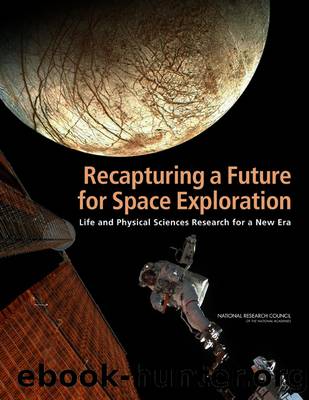Recapturing a Future for Space Exploration: Life and Physical Sciences Research for a New Era by Committee for the Decadal Survey on Biological & Physical Sciences in Space

Author:Committee for the Decadal Survey on Biological & Physical Sciences in Space
Language: eng
Format: epub
Tags: ebook, book
Publisher: The National Academies Press
Published: 2014-05-13T00:00:00+00:00
Food, Nutrition, and Energy Balance
As described more fully below, inadequate nutrition affects all aspects of long-duration spaceflight, from accelerating bone loss and reducing muscle function to diminishing cognitive ability and depressing immune response. To protect against inadequate nutrition, it is important to:
1. Fully understand nutrient needs under space conditions compared to terrestrial conditions;
2. Develop appropriate diets for space use and ensure their palatability; and
3. Ensure that the nutrients within a food remain bioactive for the duration of the mission.
NASA has done an excellent job in parsing out specific nutrient needs for spaceflight and a fair job in establishing a climate where 100 percent consumption of supplied foods is encouraged, but gaps remain in tracking the bioactivity of essential nutrients in foods as a function of food processing, storage, exposure to radiation, etc. Because nutrient deficiencies are rare, and overweight and obesity have reached epidemic levels in the general population, issues related to nutrient stability over time or food consumption patterns among astronauts have not been a focus. However, whenever an individual is totally dependent on a limited number of foods to meet 100 percent of his/her nutrient needs (e.g., infants fed formula, patients being fed intravenously, or astronauts in space), it is critical that the diet provided be nutritionally complete. For the success of long-duration space missions, it is also essential that the diet remains nutritionally complete for the prescribed amount of time and that steps are taken to ensure that individuals consume appropriate amounts of the dietâs elements to meet their nutrient and energy needs.
Impact of Spaceflight on Nutritional Status, Nutrient and Energy
Intake, and Nutrient Stability in the Food Supply
Nutritional Status in Space
A substantial amount of information has been generated about nutrient status in space, although data are lacking on the mechanisms by which nutrient status in space differs from that on Earth. A thorough and continuously updated review is provided in the Human Research Program Evidence Book,58 which highlights risk factors of inadequate nutrition and of an inadequate food system. Each of these risks is categorized as being a risk with substantial evidence rather than one which is not yet fully supported or refuted.59 A complete reiteration of the current understanding of nutrient status in space is not possible in this section, but a synopsis can be given of the most important differences between Earth and space. In particular, several deficiencies or insufficiencies are consistently reported, including inadequate energy intake (see below), depressed vitamin D and K and folate status, and diminished antioxidant capacity.
Data from individual Skylab missions show that length of mission is a factor in vitamin D status; the longer the mission, the more depressed the vitamin D status. For example, a study of 11 astronauts showed an average decrease of ~25 percent (P < 0.01) in serum 25-hydroxycholecalciferol (25-OH vitamin D3) after flight (128-195 d).60 Similarly, a decrease of 32 to 36 percent in 25-OH vitamin D3 concentrations in serum was found in Mir crew members during and after 3- to 4-month missions.61,62 Bone resorption was increased after flight, as indicated by several markers.
Download
This site does not store any files on its server. We only index and link to content provided by other sites. Please contact the content providers to delete copyright contents if any and email us, we'll remove relevant links or contents immediately.
Whiskies Galore by Ian Buxton(41995)
Introduction to Aircraft Design (Cambridge Aerospace Series) by John P. Fielding(33122)
Rewire Your Anxious Brain by Catherine M. Pittman(18644)
Craft Beer for the Homebrewer by Michael Agnew(18237)
Cat's cradle by Kurt Vonnegut(15338)
Sapiens: A Brief History of Humankind by Yuval Noah Harari(14369)
Leonardo da Vinci by Walter Isaacson(13318)
The Tidewater Tales by John Barth(12652)
Thinking, Fast and Slow by Kahneman Daniel(12267)
Underground: A Human History of the Worlds Beneath Our Feet by Will Hunt(12090)
The Radium Girls by Kate Moore(12018)
The Art of Thinking Clearly by Rolf Dobelli(10455)
Mindhunter: Inside the FBI's Elite Serial Crime Unit by John E. Douglas & Mark Olshaker(9324)
A Journey Through Charms and Defence Against the Dark Arts (Harry Potter: A Journey Throughâ¦) by Pottermore Publishing(9273)
Tools of Titans by Timothy Ferriss(8368)
Wonder by R. J. Palacio(8098)
Turbulence by E. J. Noyes(8040)
Change Your Questions, Change Your Life by Marilee Adams(7760)
Nudge - Improving Decisions about Health, Wealth, and Happiness by Thaler Sunstein(7693)
